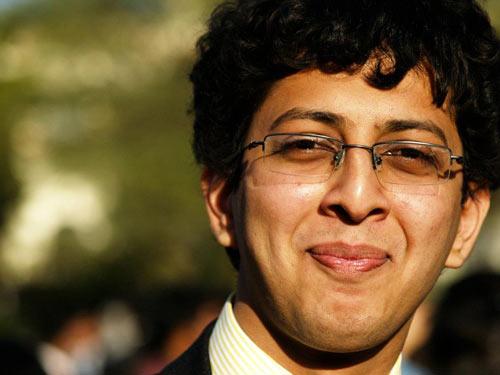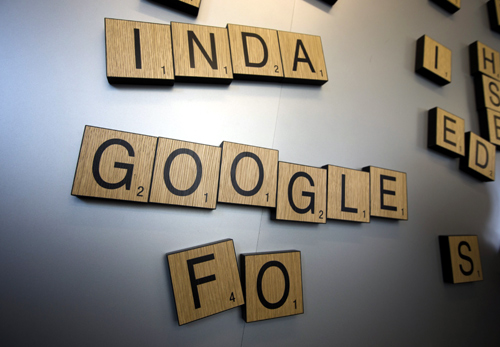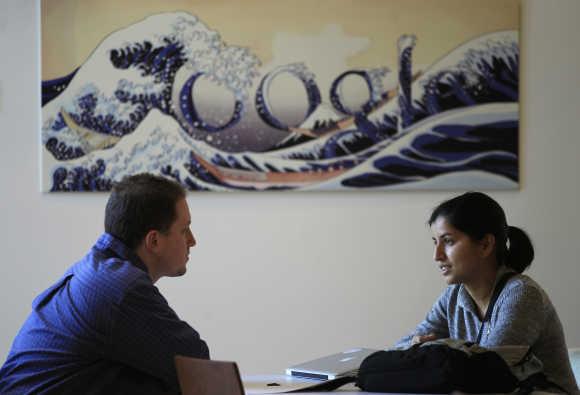Varun Deshpande, Courtesy TopTalent.in
Rushabh Agrawal, an alumnus of BITS Pilani was recently offered a job at Google for a package of Rs 1.16 crore. He takes us through the various stages of the interview process and offers crucial advice to young aspirants.
Google is consistently chosen as the best workplace in the world and engineers all around the world always aspire to be a part of this amazing and innovative organisation.
Rushabh Agrawal, a computer science graduate from BITS Pilani, recently got recruited by this dream organisation for a pay package of Rs 1.16 crore in their Mountain View, California Office.
In this interview, Agrawal speaks about his personal reactions (read jubilation), the recruitment process and offers useful tips and suggestions for all aspirants. Read on
How did it all happen?
The campus placement season at BITS Pilani kicked off with the Google written test on August 10, 2012.
Rushabh had almost forgotten about it because nobody heard from them for quite some time. But on August 28, five of the numerous applicants got calls for interviews at the Bengaluru office of Google.
And by September 6, they were in India's silicon city for their interviews. I'm sure he would agree with me when I say the wait was worth it. After all, two of the five lucky candidates (Rushabh Agrawal and Kunal Lad) had been selected for Google's Mountain View office.
When asked about his reaction to the news, Rushabh clearly demonstrated the fact that it will remain an unforgettable day for him. "It was in the afternoon and I had just come back from lunch in the hostel mess."
And that was when he saw an email informing him of his selection. He remembers the moment clearly, "I spent the next 10 minutes reading the email trying to come to terms with what was written in the email."
Within 10 minutes, he received a call from the Google HR person who confirmed his selection. That was when the joyous feeling finally seeped in for him.
While she went on to describe the package details and terms of joining, Rushabh was too jubilant to care about all that she was saying!
His friends and 'wingies' were already shouting and cheering around him -- while the HR spoke to him over the phone. Rushabh declares that the feeling was "too-good-to-be-true".
MUST READ: CA Topper: Proud to say I am my father's daughter
Courtesy:
Please click NEXT to continue reading...
Google's selection process took over a month
Image: Each interviewer at Google tested a different domain of knowledgePhotographs: Mark Blinch/Reuters
On the selection process
We've heard of those brain teasers and super-tough questions from Google's interview.
But Rushabh disagrees and says the process is "more or less similar to companies like Microsoft, Amazon etc. The only difference was in the length of the placement process."
Usually, when companies come for campus placements, the process is wrapped up within a day, on the campus itself. However, Google, Rushabh says, almost took a month.
He says there was an initial screening test followed by a series of interviews.
All interviews they had at Google were technical and each interviewer tested a different domain of knowledge and thinking.
One of the rounds featured an open ended discussion, he says. Rushabh also had a couple of publications in his kitty which he discussed with his prospective employers.
The most interesting part, according to Rushabh was that there were no eliminations at the end of each interview.
"All of them went through the same number of interviews," he clarified.
During the interview, the interviewers constantly took down observations/opinions. In his opinion, at the end of the entire process, all the points are tallied to select the candidates.
He cheerfully tells us that apart from the interview, they got to enjoy the lunch at Google and were put up in a "really awesome place for the night."
On the skill-sets companies like Google, are looking for in candidates
He informs us in a matter-of-fact way that knowledge of data structures and algorithms are a must, along with "decent coding skills."
In addition, knowledge of computer networks and object oriented programming (OOP) can come in handy as well. Knowing anything else is a bonus.
By 'anything else,' he means practice (solving problems in this case) helps a lot.
Interviewers generally evaluate a candidate based on his/her response (thinking process, approach) to unknown problems. So they look for problem solving skills as well, in addition to experience, he added.
It is an established fact that companies like Google look for highly intelligent people. And the resume, along with the interview process, gives them ample opportunities to evaluate a candidate's intelligence.
Courtesy:
'You must try to gain as much knowledge and skills as you can'
Image: To get a job at Google, you must be able to arouse the curiosity of the employerPhotographs: Lucy Nicholson/Reuters
On creating the perfect technical resume...
Companies like Google don't care about the candidates' non-technical achievements. So don't clutter your resume by mentioning those.
Keep your resume short and crisp. No point explaining everything as they do not "study" your resume, says Rushabh who had compiled his professional and educational experience to make a one page CV.
During the interview, the interviewer may glance through it and on finding something interesting, would like to talk about it.
This will start a discussion and the conversation, which is now in your hands, offers a good chance to impress the interviewer, observes Rushabh.
"Write your resume accordingly -- such that it evokes enough curiosity in the mind of the interviewer" suggests Rushabh. Also, you'll obviously want to talk about some of your projects/publications more than the rest.
So highlight your work.
Interested people would obviously want to know how much preparation goes into winning such great offers, right?
To which, Rushabh replied: "I didn't prepare for Google specifically apart from going through some of the Google interview questions available online, a couple of days before the interview."
According to him, the questions in general are similar to what one would encounter in interviews for Microsoft, Amazon or any other similar company.
"Preparing for placements in general over the summers, worked out good enough for me", he says (practice is the key, evidently)
This type of preparation is only to channelise one's thought process for the problems posed during interviews, which are different in nature to what one would otherwise encounter.
An important point to note is that the range of questions asked in interviews is not very broad. So the preparation basically familiarises you with common tricks and stuff that would come into use frequently.
Knowing them won't necessarily impress the interviewer but not knowing them would take you a notch below the rest of your competitors.
Beyond that, whatever you have done so far -- publications, projects, coding experience, etc will come into play. You basically use all the knowledge gained and skills acquired in the past few years.
We asked Rushabh to give some advice to all the students out there who're aspiring for similar job offers.
To start with, he clarifies that that the interviews at Google are not very different from those at Microsoft or Amazon, contrary to popular opinion.
He, personally, did not find them "extra difficult" (and he says this on behalf of all five who made it to the interview round)
Also, during the interview, you are not judged by how you reach the most optimal solution, you are in fact, judged on your thought process. At the same time failure to reach the final solution is not the end of it, he says.
For the first and second year students, (and many of them have asked him "the recipe" to get a job at Google), he says, "You will need a lot of coding practice and a very good knowledge of data-structures and algorithms to get a job like this." But that is not the only way, he insists.
Rushabh, himself, didn't possess a great coding profile but his profile was stronger because of his projects and publications, especially in areas like machine learning, rather than algorithms.
"What I feel is that you must try to gain as much knowledge and skills as you can. You never know what will come handy," he says.
The candidate's intelligence and problem solving ability would take care of the rest. "You basically pursue whatever interests you or excites you" he counseled.
There is no long term preparation for getting a particular job and thinking in terms of that would not only restrict you but, also, is too short-sighted an aim to have.
Of course, every aspirant has to spend small amounts of time preparing explicitly for interviews.
It's just a great exercise to streamline the thought process. Like any other interview process, a lot depends on factors beyond one's control. As they say, the rest depends on the day.
Courtesy:




Comment
article